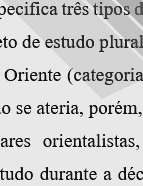

Supported by missionary work and the studies that its agents produced, which included grammars and vocabularies of native languages that sometimes featured considerations on local religions and customs, Portugal’s maritime commercial enterprise in the sixteenth and seventeenth centuries was therefore seen to have contributed to the emergence of orientalism as a corpus of knowledge about the non-European. In this vein, Pedroso wonders continuously, “And, without the direct knowledge previously obtained in the lands to which Gama sailed, and throughout which spread those who continued his work, what would have become of comparative mythology, the science of religions and comparative Indo-European law, not to mention, more specifically, archaeology and Indian philology [...]?” (Influencia dos Descobrimentos, 1898, p. 25). The historian suggests, albeit implicitly, that Europe owes a kind of epistemological debt to Portugal for having opened the way for the European project and the development of European science.
Indeed, the accumulation of knowledge about the non-European served to sustain European colonial practices, at the same time as it made possible the emergence of flourishing centres of Oriental studies, such as London, Paris, Munich, or Florence. The notion of debt would be an undercurrent in all of Portugal’s historiographical production and would mark out the country’s role as a forerunner in the production of knowledge and discourse concerning the East, although much of the work in question (from the sixteenth and seventeenth centuries) did not travel beyond linguistic barriers, seeing as most of the texts were “handwritten in Portuguese, and had a limited circulation of a few copies in the court in Lisbon and in the centres of Asia” (Barreto, “O orientalismo conquista Portugal”, 1998, p. 279). The lack of knowledge of sixteenth- and seventeenth-century Portuguese literature is, according to David Lopes (“Note historique”, 1899, p. 69), due to a scarceness of translations, which prevented its dissemination. Portugal’s lack of popularity as a centre for the production and dissemination of Oriental studies was therefore attributed to linguistic reasons, and this same explanation would be replicated in international contexts by historians such as Silva Rego (e.g., “Indological Studies”, 1956, p. 223). Furthermore, not only the historical sources, but also the works produced about them by Portuguese orientalists from the mid-nineteenth century onwards would continue to suffer from their limited accessibility. Xavier Soares’ 1936 translation of Goan linguist Sebastião Rodolfo Dalgado’s Influência do Vocabulário Português em Línguas Asiáticas [Portuguese Vocables in Asiatic Languages] (1913) was justified with the fact that Indian orientalists did not understand Portuguese and, for this reason, were unaware of both the orientalist’s name and his work (Soares, “Preface”, 1936, pp. v-vii).
